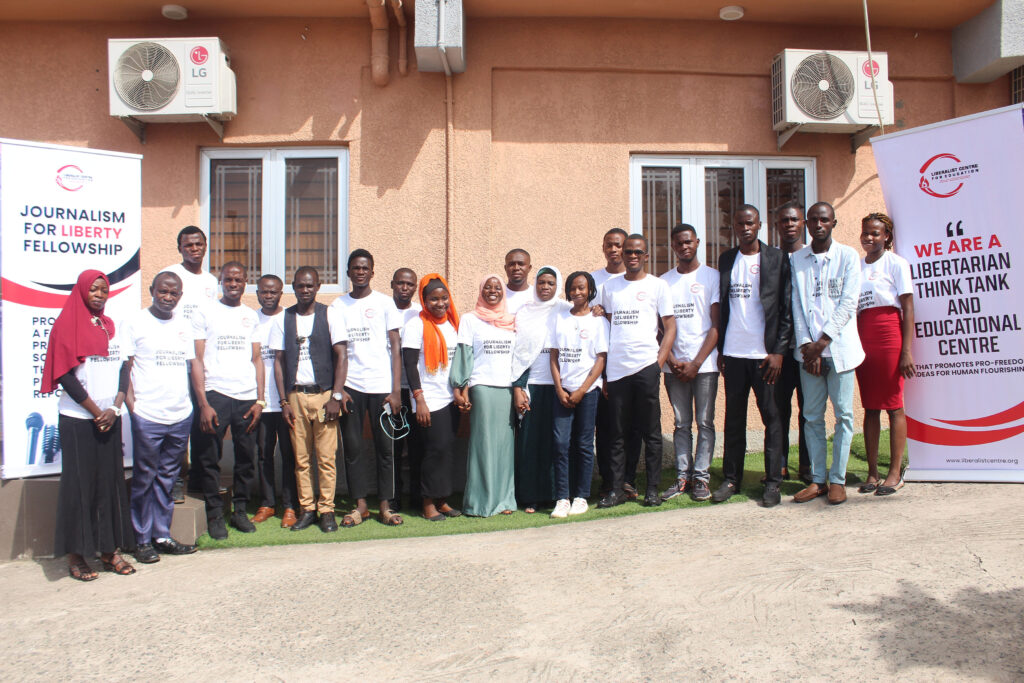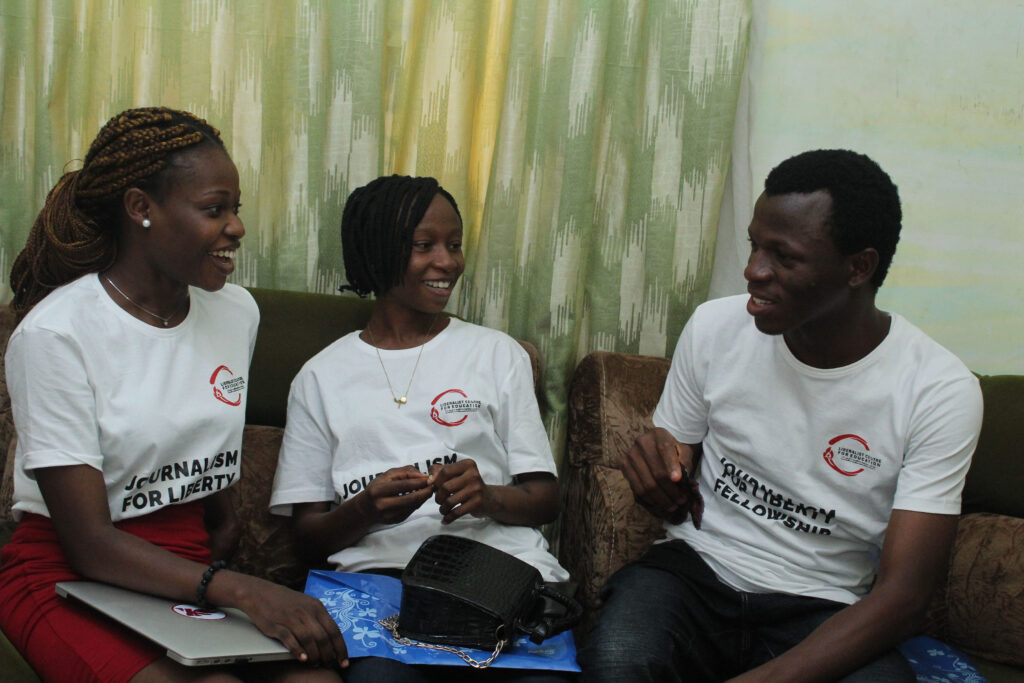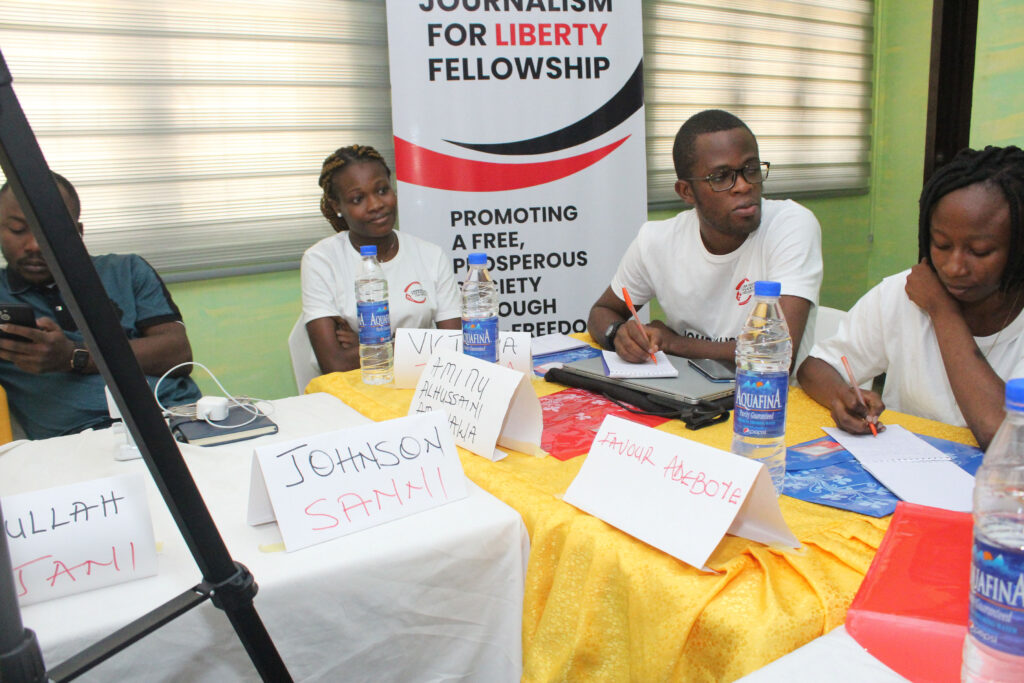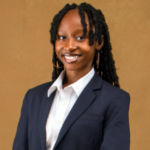
Journalism fellowships can give current and aspiring reporters the space, resources, and mentorship to refine their professional craft. The Journalism for Liberty Fellowship, hosted by The Liberalist Centre, invites writers with “an interest in the ideas of individual freedom, free market, and limited government” to contribute to investigative stories, features, and op-eds in their news magazine, The Liberalist, under training and mentorship. Similarly, the African Liberty Writing Fellowship prepares “young Africans interested in academia, media, public policy, or any other critical-and-analytical-writing-related career” in the art and craft of opinion articles.
We had the pleasure of interviewing Favour Adeboye about her experiences as a Journalism for Liberty Fellow and African Liberty Writing Fellow. In this interview, she shares with us the kinds of training and mentorship both programs provide, how these fellowships helped develop her interest in writing for liberty, and her best application tips for those interested in journalism fellowships.

Tell us about your background and professional journey. What led you to the Journalism for Liberty Fellowship?
As a young, inquisitive journalist, I had this growing passion for liberty and its ideas. I was so keen on understanding its principles and what it entails so much that I found myself participating in any project whose purpose is to promote the ideas of liberty and sustainable development goals. The good thing about my passion is that I don’t just participate: I share my opinions too. I have a blog for that purpose.
Prior to my participation in the Journalism for Liberty Fellowship, I had volunteered at non-governmental organisations and led community development projects. I have volunteered for as long as I can remember; thus, when the opportunity presented itself, I leveraged it because it was an avenue to explore liberty further, elevate my career, and connect with like-minded people. I learned about this journalism opportunity through a friend. Most of the opportunities I am a recipient of today came to me through friends I made at events. I strongly believe in networking. One’s network is one’s net worth. Aside from friends, platforms such as Profellow are an excellent avenue to discover career opportunities.
The mission of The Liberalist is to leverage journalism to promote liberty. So, one can say that the fellowship was primarily for journalists and libertarians, but it was extended to writers who support the ideas of liberty. Of course, journalism is supposed to be a discipline promoting liberty, but times have changed. There are diverse perspectives on it now; media houses can contradict the conventional roles of journalists in society.
I studied mass communication at Kwara State University, Nigeria, where I majored in broadcast and digital journalism. Journalism practice entails promoting liberty ideas, exposing issues, reporting issues, shaping public policies, protecting and promoting a free society, and, at large, freedom. The Journalism for Liberty Fellowship has all these embedded in it, so it was the perfect opportunity for me.

Can you describe what a week in the life of a Journalism for Liberty Fellow? How did it advance your career goals and expand your professional network?
The Journalism for Liberty Fellowship (JLF) is not just an avenue to learn but an avenue to explore, improve, and have fun. The fellowship was preceded by a 2-day training where the ideas of liberty, various methods of reporting, the benefits of volunteering, and more were explicitly discussed. The training model for JLF was interactive, simple, and effectively implemented. Our instructors were amazing. They made the training process easy, and everyone was willing to participate in every activity presented.
During the training, I especially loved learning the rudiments of investigative journalism and leveraging it to promote liberty. Every week spent at JLF was productive. Writing opinion pieces, features, and investigative reporting were our core duties as fellows. Constructive criticism, such as webinars and editorial feedback, was implemented to help fellows understand where to improve.
As much as I learned about pro-freedom liberty, JLF was an avenue to explore diverse aspects of my career as well as expand my professional network. For instance, the fellowship was an eye-opener to my current career path. Journalists across different niches engaged and mentored me and other fellows, most of whom are libertarians, broadcast journalists, and advocates. As an extrovert, I found getting acquainted with the other fellows relatively easy.
What motivated you to apply for African Liberty Writing Fellowship at this point in your career?
After my fellowship at The Liberalist, my passion for further learning the ideas of liberty was spurred. I am a libertarian, and getting acquainted with the concepts of liberty is not a day-long walk. It requires commitment and constant learning to properly understand what it is.
African Liberty presented an avenue not just to train 35 fellows in the ideas of liberty but also mentor liberty writers for a period of one year. My motivation in applying for the African Liberty Fellowship was the need to build on my existing knowledge of writing liberty-related pieces. The need to learn under the direct tutelage of experts was another factor that motivated me.
Finally, African Liberty is an international organisation dedicated to presenting a platform for Africans from diverse backgrounds to learn and build on to train all participants thoroughly in opinion articles. The weekly assignments, which superseded our weekly sessions, were a platform to practice what was gleaned from experts.
The African Liberty Fellowship involves a 5-Week training in addition to weekly assignments. Can you share some of the most valuable aspects of this program?
The most insightful part of the training was the constant feedback every participant received. The grading system was fair and objective too, and trainers from different races and backgrounds co-hosted the training. Participating in the training was not a guarantee of acceptance into the fellowship. Each fellow underwent a rigorous evaluation.
Access to information and learning materials during the training went a long way toward my understanding of opinion editorials. Among other subjects of training, our primary focus was learning how to write opinion articles to defend and promote the ideas of liberty.
What advice do you have for others applying for journalism and writing fellowships?
Even though fellowships are priceless opportunities, shallow understanding has a terrible effect. Before applying for fellowships, it is essential to have an in-depth knowledge of the process and what it entails.
One thing to look out for while applying for fellowships is the kind of training involved. One must be sure it aligns with one’s purpose and ideas. I think one of the major issues applicants to fellowship programmes face is ignorance. Before answering any question, one must familiarise oneself with the subject matter. Proper evaluation of application questions is key.
I hate to hear people say there are no opportunities to elevate young journalists’ careers out there. The truth is, opportunities are out there, but it takes an active, creative person to recognise them. Creativity, in this instance, is knowing the art of writing. You can’t be a journalist without knowing how to write. All forms of journalism—broadcast, digital, and print—require writing; hence, anyone who treads the field must be well grounded. That is to say, journalism fellowships are not child’s play.
My final note to any potential applicant is: “Be real, realistic, and true to yourself.” If necessary, share personal stories in your essay questions, like what motivates you. Stay away from artificial intelligence and write from your perspective. Sharing personal experiences can be a great way to connect with application reviewers.
Interested in other writing and journalism fellowships? Sign up to discover more than 2,700 professional and academic fellowships in the ProFellow database!

© 2024 ProFellow, LLC. All rights reserved.